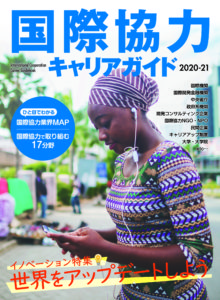IDJ English - Regional Revitalization Special
Unique strategy required for regional revitalization: JICA as a “role model"
ODA cooperation in line with Japan’s national policy
The spread of COVID-19 worldwide has seriously impacted Japan's development cooperation. All of the Japan Overseas Cooperation Volunteers (JOCV) have returned to Japan. Development actors have been forced to carry out projects remotely or implement domestic projects. However, tough times bring new opportunities. We are now in the ideal position to consider how we can make use of our knowledge of development cooperation here in Japan. An important initiative could be regional revitalization. Issues in Japan’s rural areas often parallel those in developing countries. Japanese development consultants are trying to create new businesses in Japan’s rural areas.
In recent years, JICA (Japan International Cooperation Agency) has also shown its willingness to help build a cohesive Japanese society in Japan. The Development Cooperation Charter adopted in 2015 sought to strengthen relationships with Japan’s local governments. In fact, JICA and Japanese local governments have already begun to assist developing countries through training programs and grassroots cooperation project. Mr. Hiroyuki Abe, who is responsible for domestic projects at JICA, commented that “JICA's first priority is the development of developing countries. However, if we can contribute to the development of developing countries in cooperation with Japan’s local governments, they can use the experience and know-how to revitalize their regions. With that viewpoint, we are strengthening cooperation with Japan’s local governments. "
Since the implementation of the revised Immigration Control Act in April 2019, such cooperation has been diversified by the Japanese government, including the acceptance of foreign human resources. In fact, the comprehensive measures revised at the Ministerial Meeting on the Acceptance and Coexistence of Foreign Human Resources in July 2020 created, for the first time, expectations for JICA to contribute to regional revitalization by recruiting international human resources (e.g., the JOCV) and implementing activities with International Cooperation Promotion Officers.
Dispatching JOCV trainees to Japan’s rural areas
Human resources are key to JICA's regional revitalization efforts. Currently, eight JICA staff members are seconded to local governments and are engaged in community development. According to Mr. Masato Tokuda, who is in charge of personnel affairs at JICA, “this partnership allows JICA staff to utilize their strengths (e.g., their ability to resolve social issues) to contribute to resolving local problems. It is also a good opportunity for JICA staff to develop their careers." In return, JICA has accepted 11 local government employees to offer them knowledge and experience to promote regional revitalization.
In addition to the aforementioned JOCV recruitment, “special pre-dispatch training" is being implemented. From the end of August, trainees have since been organized into corps of two to five people and dispatched sequentially. Each dispatch destination is in a) the site of the regional revitalization project of the local governments who are working to create new Continuing Care Retirement Communities (CCRCs), and b) a region where JICA cooperates (e.g., Ama-cho, Shimane Prefecture). Mr. Shunsuke Sakudo, Deputy Secretary General of the Secretariat of the JOCV, said that in “the conventional pre-dispatch training, there was a part of community practice that carried out community contribution activities around the training center. We will consider creating a new system that will enable trainees to carry out regional revitalization activities in their hometowns." This too will help JOCV members develop their careers.
The utilization of systematized knowledge in developing countries
Several cases have certainly produced results. However, I would like to make some suggestions for further contributions to regional revitalization.
First of all, JICA should have its own regional revitalization strategy. At present, efforts for regional revitalization are implemented based on policies formulated by related ministries and agencies. JICA needs a more unique strategy that anticipates how to apply its knowledge to the development of developing countries rather than producing results in isolation. For example, personnel exchanges with Japan’s local governments could be promoted more actively. JICA staff should be seconded for initiatives concerning citizens’ ageing population and health. Not only should the knowledge gained from local governments be summarized in a report for JICA, it must be systematized and accumulated internally. The declining birth rates and aging populations are becoming particularly serious in Asian middle-income countries. If JICA staff are dispatched to Japanese regions that promote advanced aging measures, they may gain useful knowledge to reference information when tackling the same problems in developing countries.
Moreover, JICA’s strategy should involve local companies and civil society in regional revitalization. Local companies’ understanding of JICA could be strengthened through mutual collaboration, and JICA’s schemes for small and medium-sized enterprises could be adapted to those who are interested in overseas business. To address the ageing population, JICA should support the domestic and overseas expansion of Japanese medical and nursing care organizations. Civil society includes people young and elderly, people with disabilities, and foreign residents. By involving them, we can create a community where no one is left behind.
JICA's primary mission remains the development of developing countries. However, I would like JICA to think about what JICA can do in Japan amid the COVID-19 crisis. The actions taken at present will set the tone for development actors who have been forced to suspend their activities in developing countries. Now is the time for JICA to become a role model for all actors involved in development. (Keitaro Fukushima)
Interview
Hone your “don't say, don't do” skills
Japan Overseas Cooperative Association (JOCA)
President Yoshinari Oya
Focusing on creating “bases”
The Japan Overseas Cooperative Association (JOCA) is an organization established by former Japan Overseas Cooperation Volunteers (JOCV). For more than 40 years, we have been promoting international cooperation and exchange projects through various activities at home and abroad.
One of the JOCA’s activities is a regional revitalization project. We have recently sent several former JOCV to Wajima City, Ishikawa Prefecture and Akiota-cho, Hiroshima Prefecture. Akiota-cho was once a prosperous town for water transportation, but that form of logistics has dramatically changed. When considering how to revitalize this town, I came up with the idea of finding human resources in the region to create a base where they could gather and interact.
However, there was no place for local people to gather on a daily basis. Therefore, this August, JOCA established “JOCA x 3” in the town. We invite everyone to come together to exchange opinions on the region’s issues to find solutions. We believe that where there is human activity, consumption will naturally occur, thus prompting regional revitalization. I want to get this project on track.
Give residents independence
Even if issues in developing countries differ from those in Japan’s countryside, strategies remain the same to understand problems, analyze them, and utilize the region’s resources to resolve problems. I believe that the spirit of harmonious coexistence, connection, and mutual cooperation that the JOCV felt at the forefront of development cooperation will be applied to revitalizing the rural areas of Japan, where interaction with people is important. The experience gained in Japan could be later used to revitalize rural areas in developing countries.
I would like current JOCV in developing countries and former JOCV involved in regional revitalization in Japan to hone their "don't say, don't do" skills. For example, the JOCV tend to do everything by themselves in an attempt to resolve local problems. In Japan, former JOCV face several situations where local residents ask for ideas and advice. However, the local residents are not the actors in the situation, which means the projects fail after JOCV leave. To avoid this, it is important to refrain from doing as much as possible and give the residents independence by offering advice from a step back.
There is a strong affinity between developing countries and Japan in terms of regional development. As the fields in which former JOCV can play an active role expand, I would be happy if JOCV consider Japan’s regional revitalization as a career option in the 100-year life era.
International Development Journal 2020 October edition
*****以下、日本語原文*****
JICAに期待される「ロールモデル」の役割
独自の地方創生戦略を
政策で明示化されたODAの連携
世界的な新型コロナウイルスの感染拡大は、日本の開発協力に深刻な影響を与えている。国際協力機構(JICA)海外協力隊は全員帰国した。開発関係者も遠隔での事業実施や国内業務への振り替えを余儀なくされている。しかし、ピンチは最大のチャンスでもある。こうした時だからこそ、「開発協力の知見を生かして、日本国内で何ができるか」を考えていくべきだ。
その答えの一つは「地方創生」だろう。日本の地方が抱える課題は開発途上国のそれと共通することも多く、地方創生を通じて新規事業の開拓に挑む開発コンサルタントも出てきている(28~29ページに詳細)。JICAもここ数年、日本国内における共生社会の構築へ注力する姿勢を見せている。
JICAはもともと、途上国から地方自治体への研修員受け入れ、草の根技術協力事業(地域提案型/地域活性化特別枠)など、地方自治体との連携を通じた途上国開発を促進してきた。2015年の「開発協力大綱」で地方自治体との連携強化が謳われてからは、これらの取り組みはさらに拡大傾向にある。JICA国内事業部次長(国内連携担当)の阿部裕之氏は、「JICAの第一義はあくまで途上国の発展」としつつ、「地方自治体と協力して途上国の発展に貢献できれば、地方自治体はそこで培った経験・ノウハウを活用して自らの地域の活性化にもつなげられる。そういった視点も持って、地方自治体との協力を強化している」と語る。
こうしたJICAと地方自治体との連携は、19年4月の改正出入国管理法の施行以降、外国人材の受け入れといった日本政府の政策に合わせてより多様化している。20年7月の外国人材の受入れ・共生に関する関係閣僚会議で改訂された総合的対応策では、地方自治体が実施する共生社会づくりに、協力隊経験者といった国際人材のリクルート(26ページ)や、JICAが全国に配置している国際協力推進員および国内拠点の活動などを通じて、JICAが貢献することが初めて打ち出された。
協力隊の訓練生を地方に派遣
JICAの地方創生における取り組みで要となっているのは、“人”だ。その一つに、地方自治体との人事交流がある(22~23ページ)。現在8名のJICA職員が地方自治体に出向し、ハード・ソフト両面でまちづくりに従事している。人事部人事課の徳田真人氏は、「地方自治体への職員出向の狙いは、JICA職員が持つ社会課題の解決能力といった強みを地方自治体の業務に生かして、日本国内の課題の解決に貢献していくことと、職員のキャリア開発の機会とすること」と話す。一方で、JICAは地方自治体から現在、11名の出向者を受け入れて、JICAの持つ途上国支援の知見・経験の地方への還元にも努めている。
協力隊については、先述のリクルートのほか、新型コロナの感染拡大を受けて派遣前訓練が延期となっている訓練生を地方創生の現場に派遣する「特別派遣前訓練」が実施されている。訓練生を2~5人の隊に編成し、8月下旬から順次派遣している。派遣先は内閣官房のまち・ひと・しごと創生本部が推進する「生涯活躍のまち」づくりに参画する地方自治体の地方創生事業の現場や、島根県海士町などJICAが協力関係にある地方自治体だ。青年海外協力隊事務局次長の作道俊介氏は、「従来の派遣前訓練の中にも訓練所周辺で地域貢献活動を行う『地域実践』のコマがある。これを拡大する形でそれぞれの訓練生の地元地域で地方創生の活動ができるような新たな制度づくりを検討する」と話す。実現できれば、協力隊員のキャリア形成の一助となるだろう。
知見を体系化し、途上国で生かせ
個々の事例を見ていくと、確かに成果は出ている。そうは言いつつも、地方創生へのさらなる貢献に向け、この場で少し提言したい。
まず、JICAは独自の地方創生戦略を持つべきだ。現状は関連省庁が策定した政策を根拠に地方創生に向けた取り組みが実施されており、独自性が見えにくい。個々で成果を出して良しとするのではなく、「知見をいかに途上国開発へと生かしていくか」までを見越した戦略が必要ではないか。
例えば、地方自治体との人事交流をより積極的に推進しても良いだろう。「少子高齢化」「保健」など課題別のテーマを設定して出向させ、出向者が出向先で得た知見やノウハウを報告書の形でただまとめるだけではなく、JICA内できちんと体系化し、蓄積していくのだ。特に少子高齢化は、アジアの中進国などでも深刻化しつつある。あらかじめ先進的な高齢化対策を進める地方へJICA職員を出向させ、その得られた知見やノウハウに全職員がアクセスできるようにすれば、途上国の高齢化問題に取りむ際に有益な参考情報となるのではないか。
加えて、戦略では「多様なアクターを巻き込む視点」も忘れてはならない。地方創生は地方自治体だけでなく、地方企業や市民社会も重要な役割を果たしている。企業とは協働を通じてJICAへの理解を深めてもらい、その中で海外展開に興味を持つところには中小企業・SDGsビジネス支援事業などJICAのスキームを提供して、海外進出を積極支援するとよい。少子高齢化対策においては医療・介護系の企業・団体の海外進出支援が考えられ、現地で得た経験を日本に還元することもできよう。市民社会には若者だけでなく、高齢者、障害を持つ人、地域に住む外国人など、多様な人たちが含まれる。彼らも巻き込むことによって、「誰も取り残さない」地域づくりを目指すのだ。
JICAの第一義的な使命は途上国の発展であることに変わりはない。しかし、コロナ禍を機に「日本で何ができるか」も改めて考えてもらいたい。熟慮の結果、繰り出された行動は途上国での活動中止を余儀なくされる開発関係者の次なる行動指針にもなるだろう。今こそ、ロールモデルとなって、開発関係者を導いてほしい。(福島 勁太郎)
Interview
「言わない、やらない」技術を磨け
(公社)青年海外協力協会(JOCA) 会長 雄谷 良成氏
「拠点」づくりに注力
(公社)青年海外協力協会(JOCA)は、青年海外協力隊(現、海外協力隊)の帰国隊員によって設立された組織だ。協力隊活動で培った精神と経験を生かす国際協力・国際交流事業を国内外で40年以上にわたり展開しており、その一つに地方創生事業がある。
現在、石川県輪島市や広島県安芸太田町などに協力隊経験者を派遣している。安芸太田町を例にとると、彼らが主に取り組んでいるのは、地域の人が集う「拠点」づくりだ。ここはかつて水運で栄えた町であったが、物流の形態が変わったことから、今では見る影もなくなっている。「こうしたまちをどのように活性化したらよいか」を考え、思い付いたのが地域内の人材掘り起しとそれらの人材が集い、交流できる「拠点」づくりであった。
しかし、この地域には人々が日常的に集える場がなかった。そこでJOCAは今年8月、町内に「JOCA×3」を設置した。あらゆる人に集まってもらい、地域が抱える問題に関して意見を交わし、解決に導いていくのだ。人の活動があれば、自ずと消費が生まれて、地域の活性化につながると考えている。この事業をしっかりと軌道に乗せていきたい。
住民に主体性を持たせる
開発途上国と日本の地方が抱える課題は異なるとしても、「地域にどう関わって問題点を理解・分析するか」「地域が持つリソースをいかに活用して解決していくか」という点では、両者に差異はない。むしろ赴任先で感じた人とのつながりや助け合いの精神が、人との交流を大事にする日本の地方部の活性化で生かされると考えている。そこで得た共生の技術を再び国外の地域おこしに活用することもできよう。
その上では、途上国の地域開発や日本の地域おこしに携わる協力隊員と協力隊経験者には、「言わない、やらない」技術を磨いてほしい。例えば、協力隊員は赴任地で「自分がこの現場を何とかする」と考えて、何でも自分でやる傾向にある。日本の地域おこしにおいては、地域住民にアイデアを問われて、「こうすべきだ」と解決策を助言してしまう場面は多い。しかし、こうすると主体は地域住民ではなく協力隊員・協力隊経験者になり、必ず失敗する。自分が去った後に事業が継続しないからだ。そうしないためには、できることであっても極力やらず、住民に主体性を持たせること、そして失敗しそうな時には「別のやり方もある」といった形で一歩引いた立場から助言することが大事だ。
途上国の地域開発と日本の地方創生の親和性は高い。帰国隊員が活躍できるフィールドは広がってきているが、人生100年時代においてはキャリア形成の一つとして、地方創生にも目を向けてくれると大変嬉しい。
『国際開発ジャーナル』2020年10月号掲載記事



